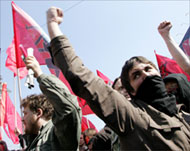Millions march on May Day
Workers have taken to streets across the globe to give voice to a variety of grievances and concerns in traditional May Day demonstrations.

In Asia, more than 10,000 people rallied in Jakarta on Monday to protest against government plans to amend a labour law, saying the changes would reduce benefits and make it harder to strike.
Protests were taking place in more than a dozen cities in Indonesia.
More than 5,000 extra police were on duty in the Philippine capital Manila in case Labour day marches turned into violent protests against the rule of President Gloria Arroyo.
The day’s events passed off peacefully on the whole with over 10,000 protesters taking part, but police wielding batons forced back thousands of protesters trying to get to the thoroughfare leading to the Malacanang presidential complex.
Demonstrators respected a government imposed deadline for rallies to cease and began to disperse voluntarily at 18:00.
In Phnom Penh, Cambodia, some 2,000 protesters did defy government orders by taking part in a march to commemorate the murder of the union leader Chea Vichea.
Soviet sentiment
In Russia hundreds of thousands of people took part in demonstrations across the country.
About 25,000 people gathered opposite the mayor’s office in Moscow to listen to speeches from trade union leaders and the mayor and a concert.
 |
|
Philippine workers demonstrate |
Around 2,000 supporters defied government order in neighbouring Belarus and marched in support of jailed opposition leader Alexander Milinkevich and to protest government attempts to crackdown on rallies by arresting and jailing opposition leaders for organising them.
But police did stop the vehicle carrying Stanislav Shushkevich, the opposition figure who had organised the march, and summoned him to appear in two days’ time at a police station on charges of staging an unauthorised rally.
Anti-globalisation
In Germany, trade unionists were preparing to draw over 5,00,000 workers out across the country in a show of force against labour reforms planned by the government of Chancellor Angela Merkel to boost economic growth.
Unions protested the impact of globalisation on Europe’s largest economy, accusing firms of sacrificing jobs for quick profit and urging the government to introduce a minimum wage.
A youth labour law was recently scrapped by the French government after massive protests and unions staged more than 100 marches across the country to continue calls for job security in the wake of the students’ victory.
Immigrant no-show
 |
|
Russian nationalists take part |
Meanwhile the US faced a nationwide strike and business boycott organised by illegal immigrants and their supporters in a bid to push through immigration reform that would legalise the presence of an estimated 12 million undocumented workers in the country.
Subcomandante Marcos, the iconic Zapatista rebel leader, will be among those marching in Mexico in support of the immigrant boycott.
However, workers and protesters in some countries were unable to voice their complaints at their governments.
May Day activities in Sri Lanka and Iraq were cancelled due to the ongoing lack of security in those countries.